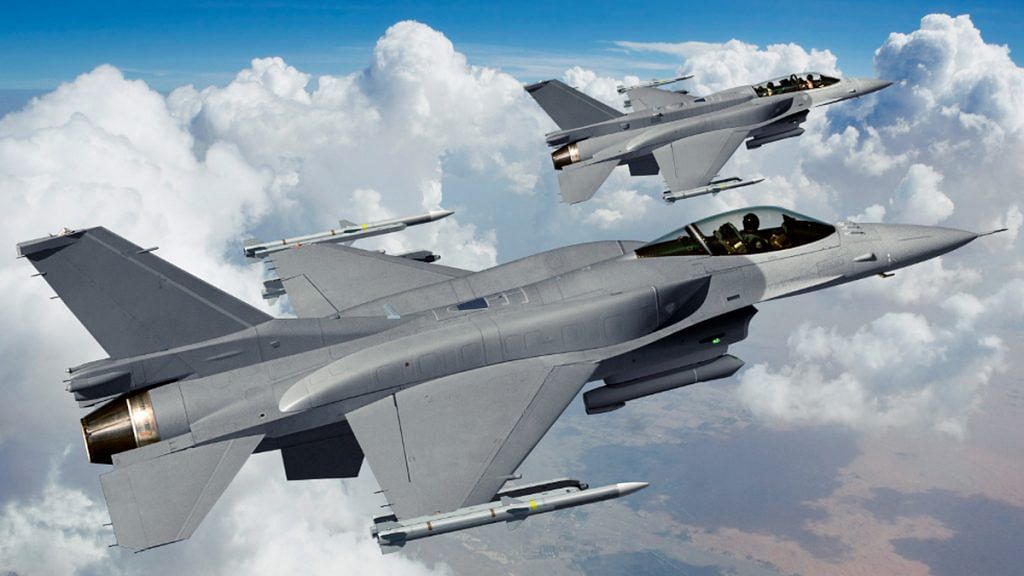New Delhi: The US will not be able to impose any kind of penalties or drag Pakistan into international arbitration for using F-16 fighters, manufactured by the American defence major Lockheed Martin, against India, a top diplomatic source told ThePrint.
The end-user agreement for Pakistan’s purchase of the F-16 fighter jets stated that Islamabad could only use them for counter-terror operations and not against adversaries – a condition Pakistan violated when it deployed the planes in its failed 27 February air strikes on Indian military installations in Jammu & Kashmir.
“The US will not be able to do much on this at all because the provisions of the end-user agreements are not legally binding,” a former State Department official, who was handling the Pakistan desk during the George W. Bush administration in early 2000, told ThePrint.
Although Pakistan has denied using F-16s in the 27 February air strikes on Indian military installations in Jammu & Kashmir, government sources say that India has presented evidence to the US to back its claim that it had.
Pakistan has also been accused of firing the US-made AIM-120 advanced medium range air-to-air missile (AMRAAM) during the strikes and the ensuing dogfight.
At a joint press conference of the three services held in the wake of the cross-border face-off, the Indian military had presented debris of the missile, which can only be fitted to F-16 fighter jets.
The Pakistan air strikes had come a day after an Indian attack on Jaish-e-Mohammed (JeM) camps in Khyber Pakhtunkhwa, as the two nuclear-armed neighbours grappled with one of the most tense phases of their difficult seven-decade relationship after a devastating terror attack in Pulwama, claimed by the JeM, that killed 40 CRPF personnel.
“If the US government had the motivation, they could have raised a stink against Pakistan using the F-16, especially the use of AMRAAM missile, which it strictly prohibited. But it will not do so,” the former State Department official added.
According to the official, the US may just shrink its military aid to Pakistan significantly while creating diplomatic pressure on Islamabad by not paying heed to some of its other demands in terms of support for its ailing economy.
Over the years, especially under the Trump administration, the official said, relations between the US and Pakistan had deteriorated rapidly.
On Tuesday, US State Department spokesperson Robert Palladino had said that Washington was following India’s allegations about the use of F-16s “closely”, even as he emphasised that “as a matter of policy” the department did not “publicly comment on the contents of bilateral agreements” which involved US defence technologies or the communications it has with other countries about it.
Also read: What Pulwama-Balakot proves: A ‘third’ actor can still push India and Pakistan into a war
India’s protests against sale of F-16 to Pakistan
India has been pressuring the US to stop selling the F-16 fighter planes to Pakistan for several years now. The latest row over this issue erupted in early 2016, when India was able to stall the sale of eight additional F-16 fighter jets to Pakistan.
In February 2016, then foreign secretary S. Jaishankar had summoned former US ambassador to India Richard Verma and lodged India’s “displeasure and disappointment” over former US President Barack Obama’s decision to sell additional fighters to Islamabad.
The State Department and Department of Defense had decided at the time that the sale of these eight planes would be subsidised by the US government.
Eventually, under protest from the US Congress, the State Department told Pakistan that it would have to pay for the jets from its own funds, pointing out that it had failed to act against the terrorist Haqqani network.
Former US Senator Larry Pressler, who advocated the famous Pressler Amendment as chairman of the US Senate’s Arms Control Subcommittee, wrote in his book Neighbours in Arms that Pakistan had been pushing the US to procure the F-16s since 1990.
However, he added, after the 9/11 attacks in the US, Pakistan “upped its advocacy campaign and convinced the George W. Bush administration to sell them the fighter jets”.
Under the Pressler Amendment, enforced in 1990, aid and military sales to Pakistan were blocked, including a consignment of F-16 fighter aircraft.
Also read: India and Pakistan are both losing the forever war
